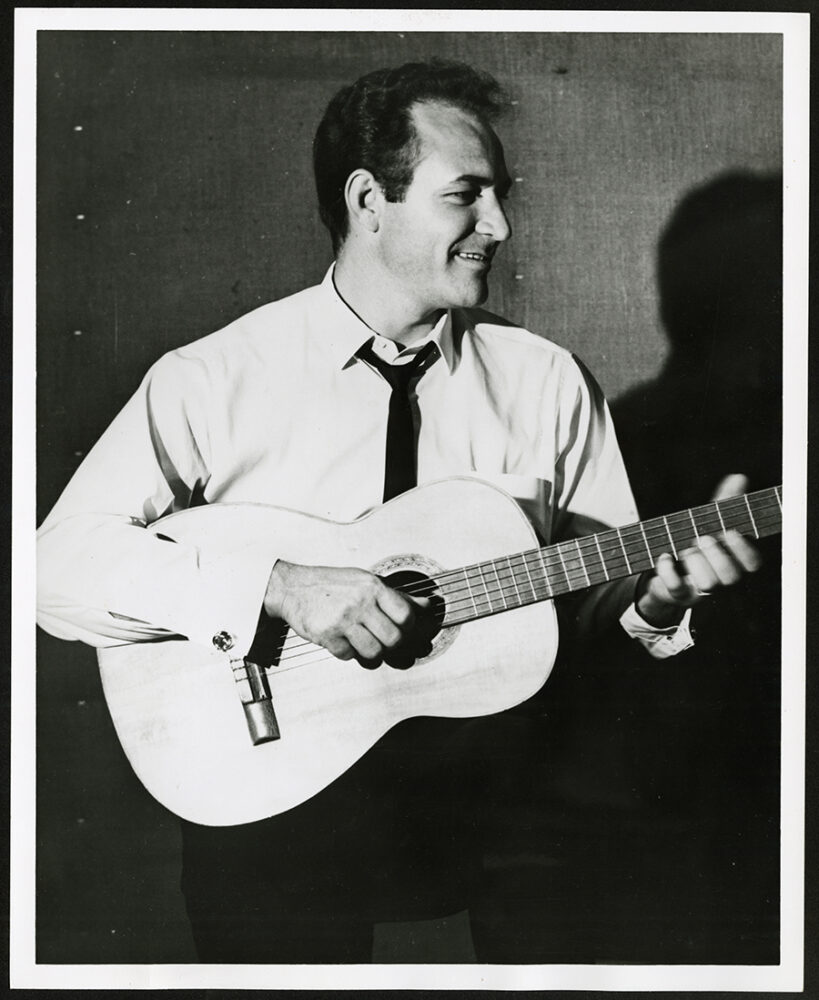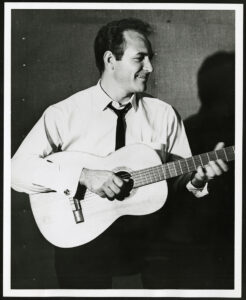Fred Carter Jr.
Fred Carter Jr. was an eclectic master guitarist who played on many important recordings.

Country Music Hall of Fame and Museum Digital Archive
Fred Carter Jr. playing guitar, 1966.
From the 1960s through the 1980s Fred Carter Jr. added his guitar artistry to a wealth of top-tier recording projects. Brief samplings of Carter’s prolific, national-level credits span a range of musical genres. He recorded in rock, pop, and folk with Bob Dylan, Joan Baez, Simon & Garfunkel, Roy Orbison, and Levon Helm of The Band; in blues with Muddy Waters; and in country with Willie Nelson and Waylon Jennings. As an in-demand studio musician, Carter was never well-known to the record-buying general public, but the music industry regarded his adaptable expertise with high respect.
Fred Carter Jr. was born in 1933 in Winnsboro, the seat of Franklin Parish, into a musical family where he learned to play mandolin, fiddle, and guitar. “I was a real farm boy from the word go,” Carter told the music historian Rich Kienzle in an interview for The Fretboard Journal; “I plowed with mules and horses, later on a tractor…. My mother would fix dinner and bring it to us kids in the fields in a car, and during dinner the Chuck Wagon Gang [a popular country gospel group] was on the radio and had an hour’s program…she’d bring my guitar and I’d sit out there in the cotton patch and play along.”
Carter joined the Air Force at age 18. He spent most of his enlisted time in the Special Services, the military’s entertainment branch, playing weekly square dances as the leader of Fiddlin’ Fred and the Southern Moonshiners. Carter then returned to Louisiana and secured a music scholarship to attend Centenary College in Shreveport.
In 1956 Carter joined the house band of the Louisiana Hayride. This popular live-performance radio program, broadcast from Shreveport, helped launch the national-level careers of Hank Williams, Johnny Cash, and Elvis Presley, among many others. Through the Hayride, Carter formed friendships with important country musicians of the ‘50s including fellow Louisianans Faron Young, singer of the hit “Hello, Walls,” and the noted session guitarist James Burton. When Burton moved to Los Angeles in the late ‘50s, Carter replaced him in the band of the proto-rocker Dale Hawkins; in turn Hawkins’s cousin, the proto-rocker Ronnie Hawkins, hired Carter to join his band, the Hawks, who were based in Toronto. Through Ronnie Hawkins, Fred Carter Jr. first met and played with the Hawks’ singing drummer Levon Helm and the guitarist Robbie Robertson, future members of The Band, one of the most unique and influential bands in the history of rock music; during this time Carter mentored Robertson. When in Louisiana, Carter played on occasion with the soulful Al “Puddler” Harris, now regarded as a swamp pop singer, although that term did not exist in the ‘50s, and with the rockabilly artist Werly Fairburn.
Tiring of Canada, Carter left the Hawks to tour with Conway Twitty, then an aspiring rock singer who would soon switch to country. In 1960 Carter moved to Nashville and soon established himself on the studio scene, in part by playing on two hits that are now considered timeless classics—“Blue Bayou” and “Dream Baby”— by the quasi-operatic pop singer Roy Orbison. Carter’s burgeoning stature led Chet Atkins, then one of country music’s preeminent producers, to engage Carter for two recording sessions a day for a solid year, even though Atkins himself was a guitar virtuoso.
Working with Atkins meant that much of Carter’s early studio work focused on conventional country. But the mid-to-late ‘60s found Carter sought by artists identified with other genres—most notably Bob Dylan, who hired Carter to play on the album Nashville Skyline in 1969. At that time country music was widely disliked and derided in the counter-culture circles where Dylan towered as an icon, so his embrace of country marked the beginning of a significant paradigm shift. Accordingly, Fred Carter Jr.—who moved effortlessly between these two worlds and was revered in both—stands as an important transitional figure in the history of American popular music. Carter also played on three hits —“Bridge Over Troubled Water,” “The Boxer,” and “The Sound of Silence”—by the cerebral New York–based duo Simon & Garfunkel. There was no trace of country music on those songs.
The mid-‘60s also saw Levon Helm, Robbie Robertson, and three other accomplished musicians leave Ronnie Hawkins to tour instead with Bob Dylan, before they went on to form The Band. In the ‘70s Carter joined Helm in the RCO All-Stars, whose members included Dr. John, the keyboardist Booker T. Jones, leader of the ‘60s instrumental soul band Booker T. and the M.G.s, plus the bassist and guitarist from that group, Donald “Duck” Dunn and Steve Cropper. Carter produced the RCO All-Stars’ sole album and later toured with a reunited configuration of The Band.
The ‘80s, for the most part, found Carter pulling away from the grind of the music business, including protracted problems associated with owning a recording studio and a record label. Intending to relax, play golf, and fish in semi-retirement, he moved back to the family farm in Louisiana, only to return to Nashville in the mid-’90s when his daughter Deana Carter had back-to-back country hits with “Did I Shave My Legs for This?” and “Strawberry Wine.” From that point on Fred Carter Jr. stayed in Nashville, briefly returning to session work with his daughter in 2008, before passing away in 2010.
